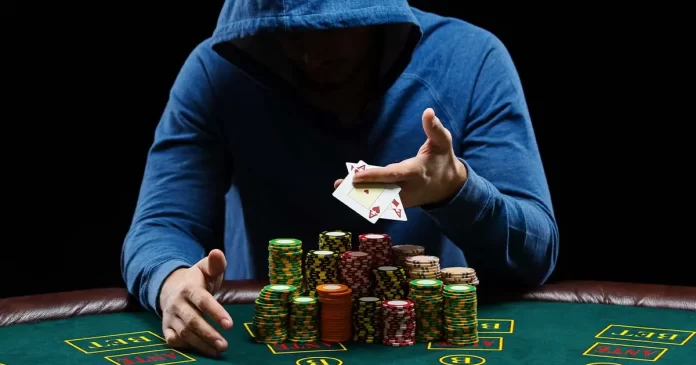Illegal Gambling has been a persistent issue in the Philippines, tempting both the desperate and the thrill-seekers. The allure of striking it rich in clandestine casinos or winning big in underground betting rings may seem enticing, but the risks involved are often hidden from view. In this comprehensive exploration, we delve into the shadowy world of illegal gambling in the Philippines.
We’ll uncover the historical context, the various types of illegal gambling activities, and their social and economic impacts. We’ll also examine the government’s efforts to curb illegal gambling and the hidden players who enable it. Finally, we’ll address the question on many minds: Is it really worth the risk?
Top 5 Online Casinos to Consider Safe for Responsible Gambling
- BK8 – Betting on a Secure Experience
- Vulkan Vegas – Where Entertainment Meets Safety
- Ice Casino – Chilling with Responsible Gaming
- GGbet Casino – Gaming Excellence Meets Responsibility
- Dafabet – Betting on Integrity and Fun
While the Philippines grapples with the challenges of illegal gambling, there are safe and legal options for those who seek responsible entertainment through online casinos. Here are the top 5 online casinos that provide a secure and enjoyable gaming experience:
BK8 – Betting on a Secure Experience
Why We Love It: BK8 casino is renowned for its diverse game selection and user-friendly interface. Players can explore a wide range of casino games and sports betting options.
Bonuses: BK8 offers generous bonuses and promotions, including a lucrative welcome bonus for new players.
License and Safety: Licensed and regulated, BK8 prioritizes player safety and ensures a fair gaming environment through regular audits and secure transactions.
Vulkan Vegas – Where Entertainment Meets Safety
Why We Love It: Vulkan Vegas offers a wide variety of games and a seamless gaming experience. Its commitment to player satisfaction shines through its user-friendly interface.
Bonuses: Vulkan Vegas provides attractive bonuses and a rewarding loyalty program for dedicated players.
License and Safety: As a licensed and regulated platform, Vulkan Vegas places a high emphasis on player safety, ensuring fair play and secure transactions.

Ice Casino – Chilling with Responsible Gaming
Why We Love It: Ice Casino stands out for its simplicity and ease of use, making it an ideal choice for players seeking a straightforward gaming experience.
Bonuses: Regular promotions and a VIP program for loyal players ensure continuous excitement.
License and Safety: Operating under a valid license, Ice Casino is committed to providing a secure gaming environment and safeguarding player interests.
GGbet Casino – Gaming Excellence Meets Responsibility
Why We Love It: GGbet Casino caters to esports and traditional casino enthusiasts alike, offering a diverse gaming library that satisfies various preferences.
Bonuses: GGbet Casino boasts competitive bonuses and a rewards program to appreciate active players.
License and Safety: GGbet Casino operates under a valid license, guaranteeing player security and fairness in all gaming activities.
Dafabet – Betting on Integrity and Fun
Why We Love It: Dafabet offers a comprehensive gaming experience with a strong focus on sports betting, making it a go-to platform for sports enthusiasts.
Bonuses: With various bonuses and promotions, including a generous welcome bonus, Dafabet keeps players engaged and rewarded.
License and Safety: Dafabet operates under a valid license, ensuring a safe and secure gaming environment while prioritizing player protection.
The Story Behind the Illegal Gambling in the Philippines
To understand the phenomenon of illegal gambling in the Philippines, we must first delve into its historical roots. The Philippines has a long history of gambling, from traditional games like cockfighting (Sabong) to more modern forms like casinos.
However, the emergence of illegal gambling has posed significant challenges for law enforcement agencies. Despite government regulations and enforcement efforts, illegal gambling activities persist, taking various forms.
Types of Illegal Gambling in the Philippines
Illegal gambling in the Philippines manifests in various forms, each presenting its unique characteristics and associated risks. Below, we provide a more detailed exploration of these prevalent forms of illegal gambling:
Cockfighting (Sabong) – Where Tradition Meets Illegality
Cockfighting, locally referred to as Sabong, is deeply ingrained in Philippine culture and tradition. This centuries-old bloodsport involves two specially bred and trained roosters pitted against each other in a fight to the death, often accompanied by extensive betting among spectators.
- Cultural Significance: Sabong is more than just a pastime; it’s a cultural phenomenon that brings communities together. It’s considered a traditional sport, particularly in rural areas, where enthusiasts gather for these events.
- Concerns of Addiction: Despite its cultural roots, Sabong raises serious concerns about addiction. The adrenaline rush from watching the fights and the lure of potential winnings can lead individuals into a cycle of compulsive gambling, causing financial distress and personal turmoil.
- Animal Cruelty: One of the most pressing concerns surrounding Sabong is the cruelty inflicted upon the roosters. These animals suffer immense harm and are often subjected to brutal death for the sake of entertainment.
Jueteng – The Numbers Game of Illicit Dreams
Jueteng is a popular illegal numbers game that has gained significant traction across the Philippines. This underground gambling activity operates through a complex network of local bookies who take bets on selected numbers, offering the promise of substantial winnings.
- Widespread Popularity: Despite being illegal, Jueteng enjoys widespread popularity in the Philippines, particularly in communities where it serves as a form of informal gambling. The game’s results are often eagerly anticipated and discussed.
- Links to Corruption and Bribery: Jueteng has a notorious reputation for its connections to corruption and bribery. Bookies operate discreetly, making payoffs to law enforcement and local officials to avoid detection and prosecution. This intertwining of gambling and corruption undermines trust in public institutions.
Online Gambling – The Digital Frontier of Illegal Gambling
Online gambling has surged in the digital age, providing an extensive array of unregulated websites that offer various casino games, sports betting, and more. This form of illegal gambling has several distinctive features:
- Anonymity and Convenience: Online gambling attracts participants who value anonymity and convenience. Players can access these websites from the comfort of their homes, making it enticing for those looking to keep their gambling activities discreet.
- Scams and Fraud: The lack of regulation in online gambling opens the door to scams and fraud. Some illegitimate platforms manipulate games or withhold winnings, leaving players vulnerable to financial losses and deception.
- Legal Boundaries: Operating outside the boundaries of Philippine law, online gambling is not only illegal but also poses substantial risks to players, who have little recourse if they encounter issues with these unregulated platforms.

Bookie Operations – The Illicit Sports Betting Scene
Bookie operations involve illegal betting on various sports events, with bookies acting as intermediaries who accept bets on the outcomes. This form of illegal gambling has distinctive characteristics:
- Links to Organized Crime: Bookie operations are often connected to organized crime networks. These networks use illegal sports betting as a means to launder money and generate revenue, which can fund other criminal activities.
- Violent Conflicts: The nature of sports betting, with high stakes and passionate bettors, can lead to violent conflicts and disputes. Rival bookies or gambling circles may clash over unpaid debts or suspicions of foul play, posing dangers to those involved.
Underground Casinos – High Stakes in the Shadows
Underground casinos represent illicit brick-and-mortar establishments that offer a range of gambling activities, primarily catering to high-stakes gamblers seeking exclusivity and secrecy.
- Exclusivity and Risk: These underground casinos create an atmosphere of exclusivity, attracting affluent individuals looking for a discreet and high-stakes gambling experience. However, their operation outside the bounds of the law carries significant risks.
- Cheating and Rigged Games: The lack of regulatory oversight in underground casinos can lead to issues like cheating and rigged games. Players may find themselves at a disadvantage, facing unfair odds or manipulated outcomes.
- Violent Conflicts: Rivalry between different underground gambling establishments can escalate into violent conflicts, posing dangers not only to those operating the casinos but also to the patrons who frequent them.
Understanding these distinct forms of illegal gambling in the Philippines highlights the intricate challenges faced by both authorities and individuals involved in this underground world. It underscores the urgent need for comprehensive measures to address the associated risks and consequences while promoting safer and legal alternatives for entertainment and gaming.
Law Enforcement and Government Efforts
Legal framework against illegal gambling
The Philippines has established a legal framework to combat illegal gambling, encompassing various laws and regulations aimed at curbing illicit activities. These include the Republic Act No. 9287, which specifically addresses illegal gambling, as well as other related laws like the Anti-Illegal Gambling Act and the Cybercrime Prevention Act.
These laws define what constitutes illegal gambling, outline penalties for offenders, and provide authorities with the tools to combat underground gambling operations.

Challenges faced by law enforcement addressing illegal gambling
Law enforcement agencies in the Philippines face several challenges when addressing illegal gambling. These challenges include:
- Resource Constraints: Limited resources, both in terms of manpower and technology, can hinder the government’s ability to effectively combat illegal gambling networks.
- Corruption: Some law enforcement officers may succumb to corruption, accepting bribes from operators or turning a blind eye to illicit activities.
- Sophistication of Operators: Illegal gambling operators often employ sophisticated tactics to evade law enforcement. They may move operations frequently, use encryption and digital currencies, and maintain a network of informants to stay one step ahead of authorities.
- Public Resistance: In some cases, illegal gambling enjoys support from local communities, making it challenging for law enforcement to crack down without facing resistance or backlash.
Government initiatives and campaigns
The Philippine government recognizes the gravity of the illegal gambling issue and has initiated campaigns and efforts to combat it. These initiatives include:
- Public Awareness Campaigns: The government has launched public awareness campaigns to educate citizens about the dangers of illegal gambling and its social consequences.
- Collaboration with Law Enforcement Agencies: Government agencies collaborate with law enforcement to enhance intelligence-sharing and coordinate efforts to dismantle illegal gambling operations.
- Legislative Amendments: The government periodically reviews and amends existing laws to address emerging challenges in the illegal gambling landscape.
The Hidden Players
Organized crime involvement
Organized crime syndicates play a significant role in the illegal gambling landscape in the Philippines. These criminal networks exploit the lucrative nature of underground gambling to launder money and generate revenue for their illicit activities. They often have international connections, making it a complex challenge for authorities to dismantle these networks fully.
Influence of political figures
The influence of political figures can cast a shadow over efforts to combat illegal gambling. Some individuals in positions of power may have ties to underground gambling operations, either directly or indirectly. This can lead to political protection for illegal gambling operators and hinder enforcement efforts.
Local syndicates and their role
Local syndicates, often with deep-rooted connections in communities, act as intermediaries and facilitators of illegal gambling activities. They provide cover for operators, payoffs to law enforcement, and create a network that keeps underground gambling thriving. Their role in sustaining the illegal gambling ecosystem cannot be underestimated.
Is It Worth the Risk?
The perspective of gamblers
From the perspective of gamblers, illegal gambling may offer higher potential winnings and a sense of thrill due to its unregulated nature. However, this comes at the cost of increased risks, including legal consequences and vulnerability to scams and fraud.
Comparing illegal and legal gambling
Comparing illegal and legal gambling reveals stark differences. Legal gambling operates within a regulated framework that ensures fairness, transparency, and responsible gaming practices. In contrast, illegal gambling lacks oversight, making it susceptible to manipulation and fraud.
Risks and consequences for participants
Participants in illegal gambling face numerous risks and consequences. These include the risk of prosecution and imprisonment, financial losses due to scams, exposure to violence, and, for some, the perpetuation of addiction. The consequences can have a profound impact on individuals and their families.
Conclusion about illegal gambling in the Philippines
The hidden truth behind illegal gambling in the Philippines reveals a complex landscape involving various forms of illicit activities, involvement of organized crime, political influence, and local syndicates. It highlights the socio-economic consequences and risks faced by participants in the underground gambling world.
The battle against illegal gambling is ongoing, with law enforcement agencies and the government striving to strengthen their efforts. Stricter enforcement, enhanced technology, and public awareness campaigns are essential components of this battle.
To combat illegal gambling effectively, there is a critical need for stricter enforcement of existing laws and regulations. Additionally, public awareness campaigns should continue to educate citizens about the dangers of illegal gambling and the importance of responsible gaming. Only through a multi-pronged approach can the Philippines hope to address the hidden truth behind illegal gambling and its far-reaching consequences.

